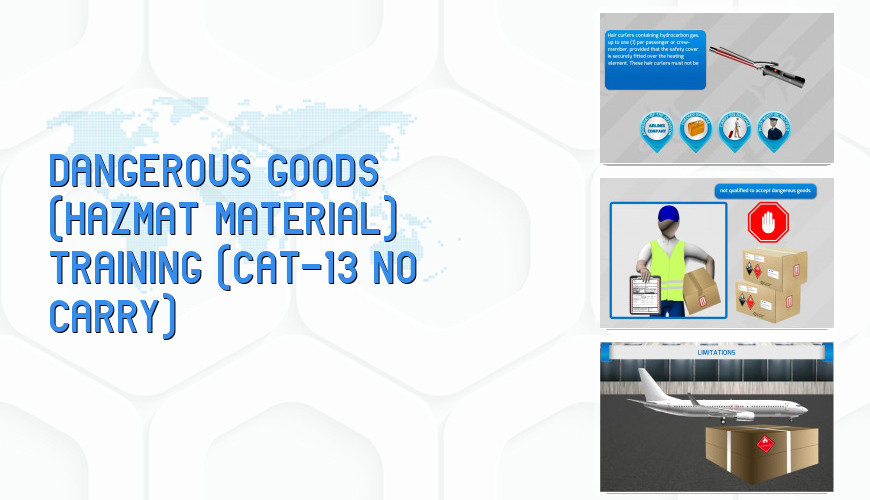
Course Information
DANGEROUS GOODS REGULATIONS CATEGORY 13 NO CARRY
Content of the Course
| Slide | 152 | Duration | 01:05:00 | Exam | Yes |
|---|
- COURSE START
- INTRODUCTION
- APPLICABILITY – GENERAL PHILOSOPHY
- Classification
- Prohibitions
- Packaging
- Marking and labeling
- Documentation
- Notification to captain
- Information to passengers and crew
- Accident and incident reporting
- Training
- Definition
- Legal basis
- Shipper s responsibilities
- Provision of information – Including emergency response information
- Training requirements
- Security of dangerous goods
- Information to shippers
- Information to passengers
- LIMITATIONS
- CLASSIFICATION AND MARKING, LABELING
- Class 1. explosives;
- Class 2 the gases;
- Division 2.1 flammable gases
- Division 2.2 non- flammable gases non –toxic gases
- Division 2.3 toxic gases
- Class 3 flammable liquids
- Class 4 flammable solids
- Division 4.1 flammable solid
- Division 4.2 spontaneously combustible
- Division 4.3 dangerous when wet
- Class 5 oxidizing substance organic peroxide
- Division 5.1 oxidizer
- Division 5.2 organic peroxide
- Class 6 toxic substance; infectious substance;
- Division 6.1 toxic substances
- Division 6.2 infectious substances
- Class 7 radioactive material
- Class 7 – category i – white
- Class 7 – category ii – yellow
- Class 7 – category iii – yellow
- Class 7 – fissile
- Class 8 corrosive substances
- Class 9 miscellaneous dangerous goods
- Handling labels:
- Orientation labels:
- Cryogenic liquid:
- Keep away from heat:
- Cargo aircraft only:
- Magnetized material:
- Globally harmonized system
- The Shipper s declaration for dangerous goods (dgd)
- Air Waybill (awb)
- Articles and substances not subject to these regulations (not restricted)
- Acceptance – Operator and cargo agent s responsibility
- Consumer product warning
- Irrelevant labelling
- Dangerous goods shipments—acceptance checklist not required
- Acceptance checklists
- Acceptance of unit load devices containing dangerous goods
- Acceptance of dangerous goods in consolidations
- EMERGENCY PROCEDURES
- Emergency procedures
- Contaminated cargo and baggage
- Dangerous goods accidents and incidents
- Reporting the accidents and incidents
- COURSE END
